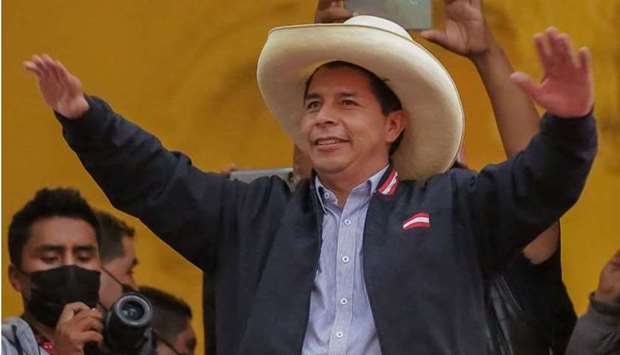Pedro Castillo maintained a slim lead over rival Keiko Fujimori in Peru’s presidential election yesterday, with almost all votes counted, but with a chunk of contested votes yet to be scrutinised by electoral authorities.
Castillo, an elementary school teacher and political novice who won widespread grassroots backing for pledges to rewrite the constitution and redistribute wealth, had 50.2% of the vote, maintaining a 0.4 percentage point lead over right-wing Fujimori, or 71,254 votes.
Some 300,000 contested votes are being scrutinised by an electoral jury, a process that will take several days to complete and could delay the announcement of who will be the next president to take over from interim leader Francisco Sagasti at the end of July.
However, analysts said that was unlikely to be enough to change the outcome, and many in the region were already celebrating Castillo’s victory.
In Brazil, leftist former president Luiz Inacio Lula da Silva, who is widely expected to challenge far-right President Jair Bolsonaro in next year’s election, said that Castillo had struck a blow to conservatism in the region.
“The result of the Peruvian polls is symbolic and represents another advance in the popular struggle in our dear Latin America,” he said.
Castillo’s rival has yet to concede, though.
On Wednesday night, Fujimori, the daughter of polarising former president Alberto Fujimori, told journalists that she would seek the annulment of about 500,000 votes which she said were suspicious, without providing substantial evidence.
She questioned the likeliness of voting tables grouping up to 300 ballots in which she got no votes at all.
Fujimori said those votes should be looked into, adding that she was not accusing the electoral authorities of being complicit in any wrongdoing.
The ethics tribunal of the National Jury of Elections (JNE), the body charged with overseeing the legality of the electoral process, said in a statement on Twitter yesterday morning that throwing doubt on the results without evidence was “irresponsible”.
Castillo’s Peru Libre party says there is no evidence of suspicious activity.
Independent electoral observers say the vote was carried out cleanly.
Castillo’s 0.4% lead over Fujimori, though slim, is more sizeable than the 0.24% by which Fujimori lost to Pedro Pablo Kuczynski in the 2016 presidential election.
“Then, Fujimori did not demand a recount, but given the political and legal stakes for her, she may do this time round,” said Eileen Gavin, principal analyst of Global Markets and the Americas for risk consultancy Verisk Maplecroft.
Fujimori, who was jailed for more than a year pending a trial over accusations that she accepted illegal campaign contributions when she first ran for the presidency in 2011, is still entangled in legal woes.
She has denied the allegations and called them political persecution.
Yesterday prosecutor Jose Domingo Perez requested that Fujimori’s bail be revoked and she be returned to custody pending the trial, arguing that she had been in contact with a witness.
The request will be heard by a judge in the coming days.
A spokesman for Fujimori did not respond to a Reuters request for comment.
A victory in the presidential election would halt her case until the end of her administration.

(File photo) Pedro Castillo
